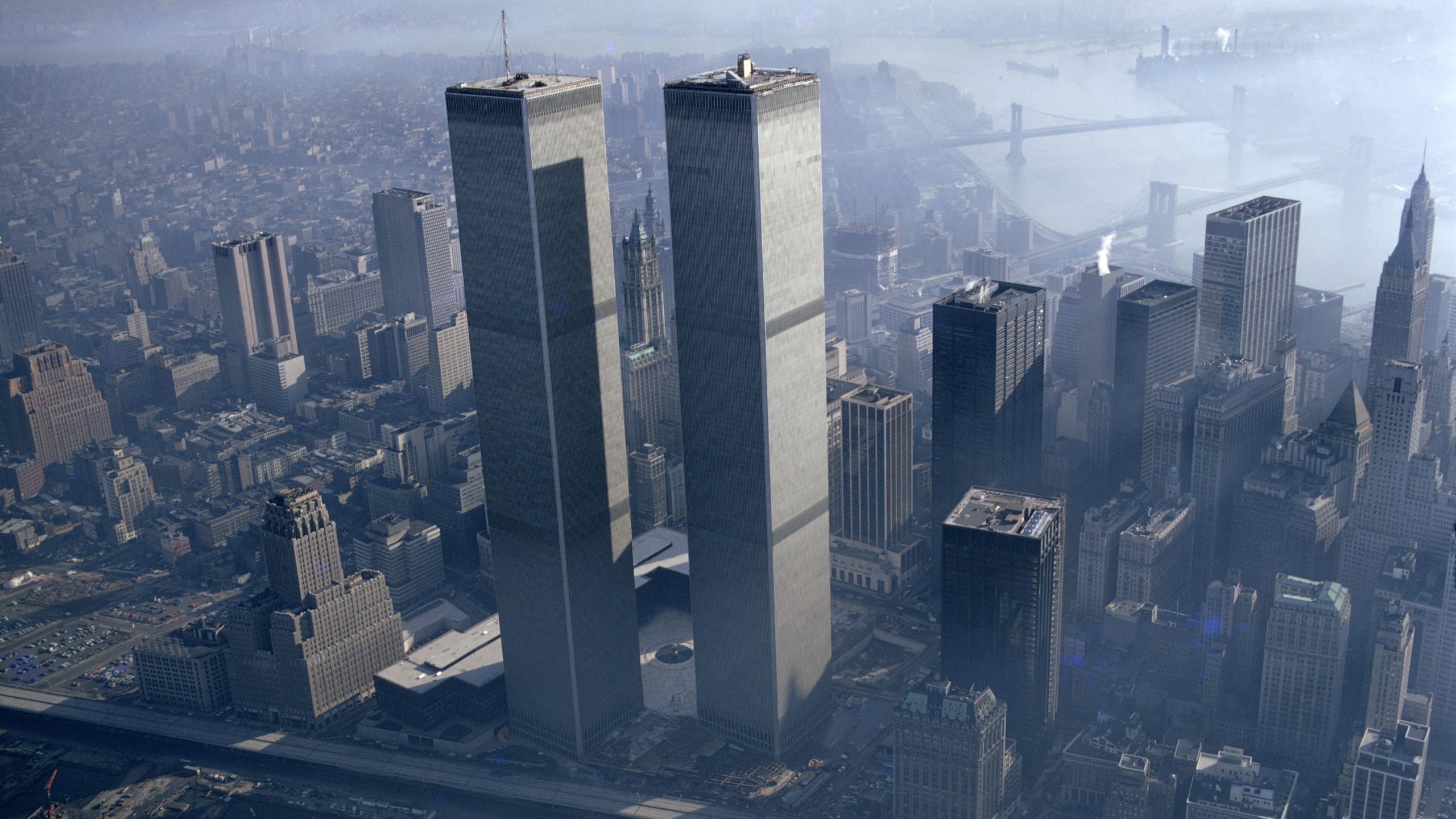The Day My Coworkers and I Chose Our Survival Over Our Supervisor
Like many during this pandemic, my coworkers and I were told on September 11, 2001, to possibly risk our lives by staying on the job. Instead, we walked out.

An aerial view of the World Trade Center towers before they were attacked on September 11, 2001.
On the morning of September 11, 2001, I was working at a small UPS delivery center a few blocks from the World Trade Center. At the sound of the first explosion, we ran outside and stared at the burning North Tower. We were in a state of shock, which then turned to panic after another plane crashed into the South Tower.
We rushed back into the center to grab our things and get home — until we were stopped cold by a supervisor I’ll call Billy, who said we were to stay where we were until he heard otherwise from his bosses.
In this moment, all of us worried that another plane, maybe more than one, might come crashing in at any moment — or maybe something even worse that we hadn’t seen yet. Even as Billy spoke, we could see hundreds of people streaming uptown through the glass walls of our delivery center. A friend of mine who I’ll call Jason started moving toward the door.
“If you leave,” Billy said, “turn over your ID, because you’re not coming back.”
What followed was maybe forty-five seconds of pandemonium — Billy yelling at Jason, me yelling at Billy, others rushing to Jason to keep him from attacking Billy — that ended when a few of us made a simple decision: we were going to walk out. The other twenty or so workers in our center quickly followed, and our brown uniforms dissolved into the mass of blue and black suits fleeing the Financial District.
Jason and I were halfway across the Brooklyn Bridge when the South Tower collapsed. We wondered if Billy was somewhere in that awful cloud of debris, still awaiting instructions.
Two days later, we reported back to the larger UPS hub on Spring Street in the West Village, now festooned with a giant American flag that management was able to procure on two days’ notice, even as it took them weeks to supply some of us with masks. My memories from delivering around Ground Zero in the subsequent weeks don’t match what became the official national memory of the fall of 2001 being a time of collective mourning and shared resolve.
In half-empty office buildings, mailroom workers and secretaries complained about being forced to work in a toxic zone. On the desolate streets, passersby would gesture at the smoke all around us and make bitter jokes about the EPA’s claim (later revealed to be false) that the air quality was safe. And at Spring Street, UPS workers talked darkly about what they would do if Billy turned up. He was never assigned to our center again.
I hadn’t thought about Billy in years, but lately he’s come up regularly in my mind as I hear a stream of bitter stories about managerial malpractice in the face of the coronavirus crisis.
One friend, a teacher, is so angry at the administrators who belittled her concerns in early March about their elementary school remaining open that she now says she can’t imagine working in the same building when everyone finally returns. Another friend who’s a nurse sullenly shakes his head at his hospital’s higher-ups who claimed it was safe to reuse a single N95 mask all week while treating COVID patients. My wife is beside herself that an older paralegal with prior respiratory issues felt pressured by management at her legal defense agency to needlessly continue working in the courts even as others had begun staying home — and is now dead.
In the days after 9/11, I felt more pity than anger toward Billy. Faced with a quick decision, he humiliated himself by revealing a middle manager’s instinct to put the interests of a corporation that didn’t know his name before his own life. But I felt that way because there was no third plane that day, and the only consequence of his bureaucratic bumbling was the loss of his own dignity.
Today, there are thousands of managers overseeing workers who hold them personally responsible for the actual deaths of coworkers and friends — and, unlike Billy, most of them are going to continue doing exactly what they’ve been doing. At a time when we’re all wondering how long shutdowns will continue and how many of us will have a job a year or three months from now, the question of employee grievances may not seem like a top concern. But in a country with already high rates of gun ownership and workplace shootings, it should be.
Fortunately, there is some reason here for hope that employees can find a more productive response to the experience of having their lives devalued. The first months of this pandemic have seen a spate of organized job actions, union campaigns, and nonunion workplace organizing among workers at supermarkets, warehouses, and shopping companies who are looking for a say over their health and safety conditions on the job. This is exactly what is needed right now, especially as governors and CEOs start to reopen the economy long before it’s safe.
One reason my coworkers and I were able to flee the Financial District before the towers collapsed was that we were dues-paying members of Teamsters Local 804, and we knew that even if Billy tried to terminate us, we’d have a chance to defend our actions. A union doesn’t automatically protect you from unsafe working conditions, but it can give you the freedom to follow your survival instincts instead of your supervisor.